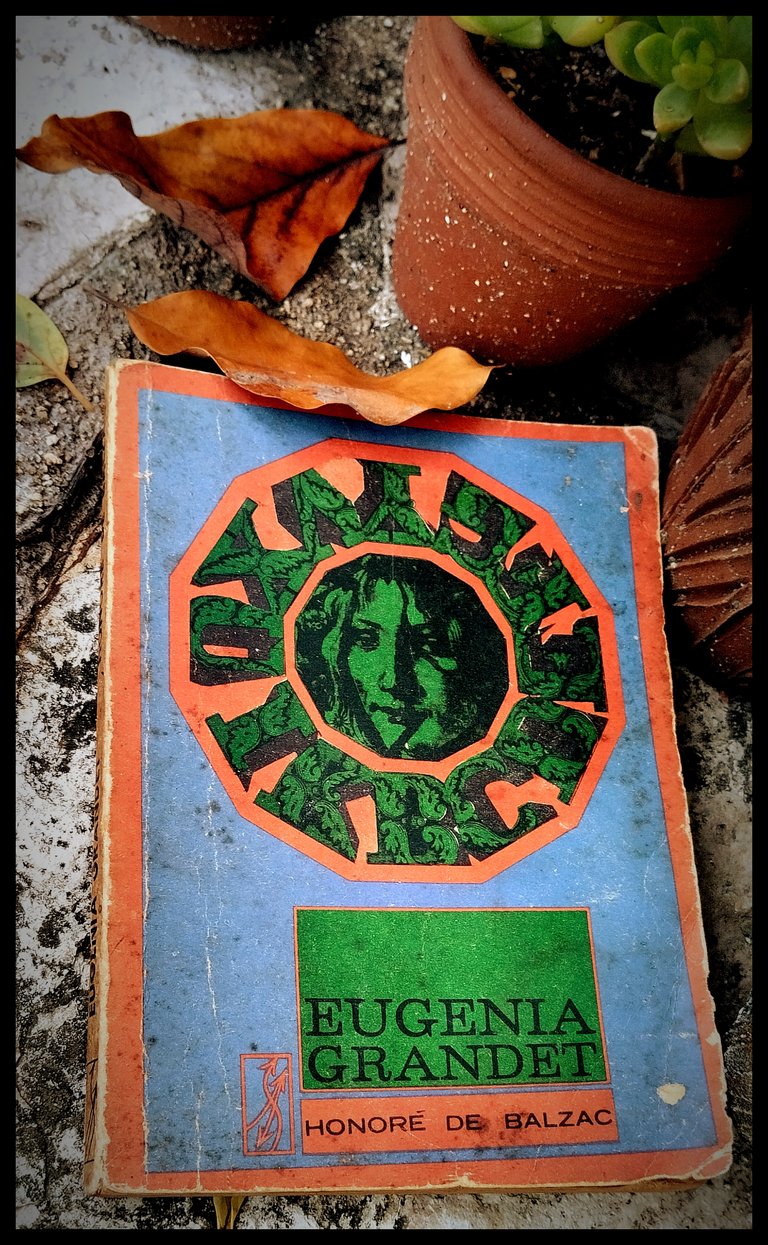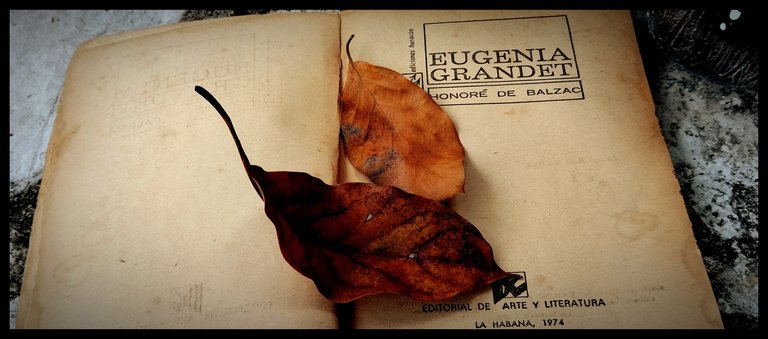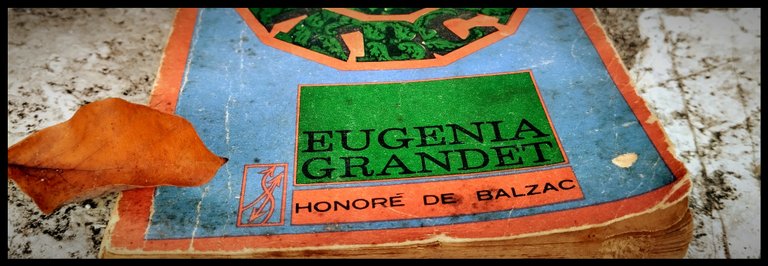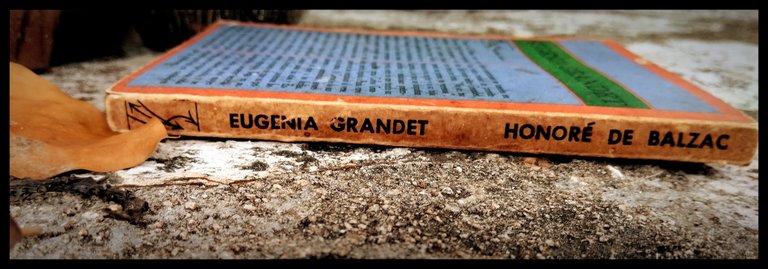There are books that are not read only with the eyes, but with the hands that hold them, with the touch of paper that holds more than just words. This copy of Eugénie Grandet came to me as important things do: quietly, as a family heirloom, with that silent dignity carried by objects that have witnessed several generations.

This is no ordinary book; it is one of those volumes that weigh on the soul, with yellowed pages and a worn spine betraying its years of life before reaching me. Balzac did not merely write a novel; he wrote a mirror in which, a century and a half later, we still recognize ourselves.
Eugenie's story is that of a provincial girl trapped between the tyranny of a miserly father and the shattered dreams of an impossible love. Old Grandet, with his obsession for gold, is capable of freezing time in his home, of turning every coin into a weight upon his daughter’s heart. Yet Eugénie does not break: there is a sorrowful grandeur in her silence, in her way of loving without asking for anything in return, in that strength born of resignation.

The plot unfolds with the arrival of Charles Grandet, Eugénie’s cousin. She, innocent and kind-hearted, falls in love with him and, in an act of rebellion against her father, gives him her gold coins to help him leave for the Indies and make his fortune. The selfishness and cruelty of Grandet, along with Charles’ subsequent betrayal, will seal Eugénie’s tragic fate.
Honoré de Balzac does not judge; he only shows, and therein lies his genius: in letting the reader discover for themselves the seams of human misery. A fierce dance unfolds—greed and power, sacrifice, innocence, disappointment, and female oppression.

Perhaps what is most moving about this book is not just the plot, but how it has survived through time, how it came into my hands. Between its pages, I find pencil marks, a coffee stain, a dog-eared corner on an especially harsh passage. Someone before me felt the same. Someone underlined the phrases that also pierced me, and that is the beauty of old books.
Though the pace is slow, the dramatic intensity and richness of the characters make this novel an essential read. Eugénie lingers, with her intimate tragedy, in the reader’s mind as a symbol of purity in a corrupt world.

Eugénie Grandet hurts, yes, but it is one of those necessary novels—the kind that leave beautiful scars—because though it speaks of greed and disillusionment, it also speaks of that faint light that endures in characters like Eugénie, who choose to love even when the world has given them reasons not to. Perhaps that is why, every time I reread it, I feel this book is not just mine: it belongs to all those who, before and after me, have found in its pages a refuge to understand that literature, in the end, is just that—a place where time stands still and emotions never grow old.

https://ecency.com/hive-180164/@neuropoeta/one-woman-one-book-one
https://ecency.com/hive-180164/@neuropoeta/the-forgotten-bronte-why-agnes
https://ecency.com/hive-180164/@neuropoeta/rebecca-when-the-past-never


✨ 𝑻𝒉𝒂𝒏𝒌𝒔 𝒇𝒐𝒓 𝒓𝒆𝒂𝒅𝒊𝒏𝒈! ✨
𝑰𝒇 𝒚𝒐𝒖 𝒅𝒐𝒏’𝒕 𝒌𝒏𝒐𝒘 𝒎𝒆 𝒚𝒆𝒕—𝑰’𝒎 𝒂 𝑪𝒖𝒃𝒂𝒏 𝒏𝒆𝒖𝒓𝒐𝒍𝒐𝒈𝒊𝒔𝒕 𝒂𝒏𝒅 𝒘𝒓𝒊𝒕𝒆𝒓, 𝒂 𝒎𝒐𝒕𝒉𝒆𝒓, 𝒂 𝒘𝒐𝒎𝒂𝒏, 𝒂𝒏𝒅 𝒂 𝒅𝒓𝒆𝒂𝒎𝒆𝒓 𝒘𝒉𝒐’𝒔 𝒇𝒐𝒖𝒏𝒅 𝒊𝒏 𝑯𝒊𝒗𝒆 𝒂 𝒃𝒆𝒂𝒖𝒕𝒊𝒇𝒖𝒍 𝒔𝒑𝒂𝒄𝒆 𝒕𝒐 𝒔𝒐𝒂𝒓.
𝑨𝒍𝒍 𝒕𝒆𝒙𝒕 𝒂𝒏𝒅 𝒊𝒎𝒂𝒈𝒆𝒔 𝒂𝒓𝒆 𝒎𝒚 𝒐𝒓𝒊𝒈𝒊𝒏𝒂𝒍 𝒄𝒓𝒆𝒂𝒕𝒊𝒐𝒏𝒔, 100% 𝒉𝒖𝒎𝒂𝒏-𝒎𝒂𝒅𝒆 (𝒏𝒐 𝑨𝑰).
𝑩𝒂𝒏𝒏𝒆𝒓 𝒅𝒆𝒔𝒊𝒈𝒏𝒆𝒅 𝒃𝒚 𝑳𝒖𝒎𝒊𝒊.
𝑳𝒐𝒗𝒆𝒅 𝒕𝒉𝒊𝒔 𝒑𝒐𝒔𝒕? 𝑼𝒑𝒗𝒐𝒕𝒆, 𝒄𝒐𝒎𝒎𝒆𝒏𝒕, 𝒐𝒓 𝒓𝒆𝒃𝒍𝒐𝒈 𝒕𝒐 𝒔𝒑𝒓𝒆𝒂𝒅 𝒕𝒉𝒆 𝒘𝒊𝒏𝒈𝒔 𝒐𝒇 𝒄𝒓𝒆𝒂𝒕𝒊𝒗𝒊𝒕𝒚! 💛
VERSIÓN EN ESPAÑOL
Eugenia Grandet: libros que heredamos e historias que nos habitan
Hay libros que no se leen solo con los ojos, sino con las manos que los sostienen, con el roce del papel que guarda algo más que palabras. Este ejemplar de Eugenia Grandet llegó a mí como llegan las cosas importantes: sin ruido, por herencia familiar, con esa dignidad callada que traen los objetos que han sido testigos de varias generaciones.

Este no es un libro cualquiera; es uno de esos volúmenes que pesan en el alma, con las páginas amarillentas y ese lomo gastado que delata sus años de vida antes de llegar a mí. Balzac no solo escribió una novela; escribió un espejo en el que, siglo y medio después, seguimos reconociéndonos.
La historia de Eugenia es la historia de una muchacha de provincia atrapada entre la tiranía de un padre avaro y los sueños rotos de un amor imposible. El viejo Grandet, con su obsesión por el oro, es capaz de congelar el tiempo en su casa, de convertir cada moneda en una losa sobre el corazón de su hija. Sin embargo, Eugenia no se rompe: hay una grandeza triste en su silencio, en esa manera de amar sin pedir nada a cambio, en esa fortaleza que nace de la resignación.

La trama se desencadena con la llegada de Charles Grandet, primo de Eugenia. Ella, inocente y bondadosa, se enamora de él y, en un acto de rebelión contra su padre, le entrega sus monedas de oro para ayudarlo a marcharse a las Indias y hacer fortuna. El egoísmo y la crueldad de Grandet, junto con la posterior traición de Charles, serán responsables del destino trágico de Eugenia.
Honoré de Balzac no juzga, solo muestra, y ahí está su genio: en dejar que el lector descubra por sí mismo las costuras de la miseria humana. Bailan en una danza feroz: la avaricia y el poder, el sacrificio, la inocencia, la decepción y la opresión femenina.

Probablemente, lo que más conmueva de este libro no es solo la trama, sino cómo ha sobrevivido al tiempo, cómo ha llegado hasta mis manos. Entre sus páginas encuentro marcas de lápiz, una mancha de café, una esquina doblada en un pasaje especialmente duro. Alguien antes que yo sintió lo mismo. Alguien subrayó las frases que a mí también se me clavaron, y eso es lo hermoso de los libros viejos.
Aunque el ritmo es pausado, la intensidad dramática y la riqueza de los personajes hacen de esta novela una lectura indispensable. Eugenia queda grabada, con su tragedia íntima, en el lector como un símbolo de pureza en un mundo corrupto.

Eugenia Grandet duele, sí, pero es una de esas novelas necesarias, de las que dejan cicatrices hermosas, porque aunque hable de avaricia y desengaño, también habla de esa luz tenue que perdura en los personajes que, como Eugenia, eligen amar incluso cuando el mundo les ha dado razones para no hacerlo. Quizás por eso, cada vez que lo releo, siento que este libro no es solo mío: es de todos los que, antes y después de mí, han encontrado en sus páginas un refugio para entender que la literatura, al final, es eso: un lugar donde el tiempo se detiene y las emociones nunca envejecen.

https://ecency.com/hive-180164/@neuropoeta/one-woman-one-book-one
https://ecency.com/hive-180164/@neuropoeta/the-forgotten-bronte-why-agnes
https://ecency.com/hive-180164/@neuropoeta/rebecca-when-the-past-never


✨ ¡𝑮𝒓𝒂𝒄𝒊𝒂𝒔 𝒑𝒐𝒓 𝒍𝒆𝒆𝒓! ✨
𝑺𝒊 𝒂ú𝒏 𝒏𝒐 𝒎𝒆 𝒄𝒐𝒏𝒐𝒄𝒆𝒔: 𝒔𝒐𝒚 𝒏𝒆𝒖𝒓ó𝒍𝒐𝒈𝒂 𝒚 𝒆𝒔𝒄𝒓𝒊𝒕𝒐𝒓𝒂 𝒄𝒖𝒃𝒂𝒏𝒂, 𝒎𝒂𝒅𝒓𝒆, 𝒎𝒖𝒋𝒆𝒓 𝒚 𝒔𝒐ñ𝒂𝒅𝒐𝒓𝒂 𝒒𝒖𝒆 𝒆𝒏𝒄𝒐𝒏𝒕𝒓ó 𝒆𝒏 𝑯𝒊𝒗𝒆 𝒖𝒏 𝒉𝒆𝒓𝒎𝒐𝒔𝒐 𝒆𝒔𝒑𝒂𝒄𝒊𝒐 𝒑𝒂𝒓𝒂 𝒗𝒐𝒍𝒂𝒓.
𝑬𝒍 𝒕𝒆𝒙𝒕𝒐 𝒚 𝒍𝒂𝒔 𝒊𝒎á𝒈𝒆𝒏𝒆𝒔 𝒔𝒐𝒏 𝒅𝒆 𝒎𝒊 𝒂𝒖𝒕𝒐𝒓í𝒂, 100% 𝒉𝒖𝒎𝒂𝒏𝒐𝒔 (𝒔𝒊𝒏 𝑰𝑨).
𝑩𝒂𝒏𝒏𝒆𝒓 𝒅𝒊𝒔𝒆ñ𝒂𝒅𝒐 𝒑𝒐𝒓 𝑳𝒖𝒎𝒊𝒊.
¿𝑻𝒆 𝒈𝒖𝒔𝒕ó 𝒆𝒔𝒕𝒂 𝒑𝒖𝒃𝒍𝒊𝒄𝒂𝒄𝒊ó𝒏? 𝑽𝒐𝒕𝒂, 𝒄𝒐𝒎𝒆𝒏𝒕𝒂 𝒐 𝒓𝒆𝒃𝒍𝒐𝒈𝒖𝒆𝒂 𝒑𝒂𝒓𝒂 𝒂𝒚𝒖𝒅𝒂𝒓 𝒂 𝒅𝒆𝒔𝒑𝒍𝒆𝒈𝒂𝒓 𝒆𝒔𝒕𝒂𝒔 𝒂𝒍𝒂𝒔. 💛

